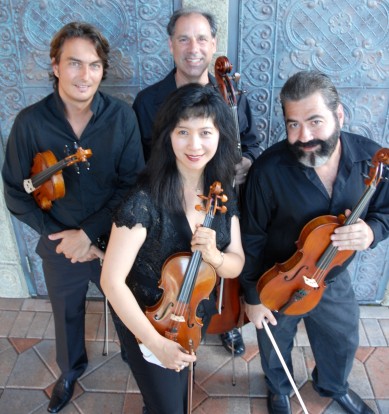At a time of cutbacks, a Florida string quartet expands to three counties
On a quiet street in Davie, in a living room crammed with musical memorabilia including a glowering bust of Beethoven, members of the Delray String Quartet sit down for a long evening’s work.
The rehearsal of pieces by Franck and Beethoven is intense and goes past 10 p.m., as the players stop every minute or two to discuss points of phrasing and interpretation, lacing their conversation with the Italian terms that come as naturally to musicians as Latin comes to lawyers.
“Do we want to keep this the same tempo or accelerando?” asks Richard Fleischman, the bearded violist whose observations dominate the rehearsal, after a passage of Franck’s Piano Quintet in F Minor, where they were joined by Lynn University pianist Tao Lin. “If we hold back, it’s like we keep the excitement from happening.”
When they turn to the first movement of Beethoven’s Quartet in C Minor, Op. 18, he says, “The tendency is to play this as a very stormy romantic piece, but remember it’s still Opus 18. It’s like Haydn and Mozart.” They try the faster tempo and the work achieves a light, fleet quality that’s absent from most performances.
In the past, these painstaking rehearsals – and there would usually be four of them – would culminate in a single concert at the Colony Hotel in downtown Delray Beach. But this season, the Delray String Quartet is going regional, with regular concerts scheduled in Coral Gables, Fort Lauderdale and Wellington, in an attempt to expand beyond its loyal but limited base in southern Palm Beach County.
Although the quartet has won praise from critics for polished, energetic accounts of classics of the quartet literature, members say they have become frustrated with the limited opportunity to perform after so much hard work.
“We practice many, many hours and just have one performance,” said first violinist Mei Mei Luo, who hosted that evening’s rehearsal session. “We always want to repeat our performances because you rehearse so many times, you want to use it.”
Adds Fleischman, “Rehearsals are fine, but you really need to perform, perform and perform if you want to be a good quartet. It’s in a performance – without sounding too dramatic about it – where the magic happens. You don’t really know how it sounds until you’re out there performing.”
In fragmented South Florida, a land of transient populations, strip malls and gated communities, it’s notoriously difficult to create regional institutions. The area has three daily newspapers, two television media markets, clumps of office buildings scattered haphazardly around and no real civic center.
The defunct Florida Philharmonic attempted to cut across county lines, traveling up and down the coast and earning the nickname the I-95 Orchestra, but it failed to generate enough regional loyalty to save itself from collapse.
The Miami-based choir Seraphic Fire successfully made the move into Fort Lauderdale but couldn’t penetrate Palm Beach County. “The farther you get from your home base, it becomes tougher because you don’t know the market as well,” said Patrick Dupré Quigley, Seraphic Fire’s artistic director. “When we started in Fort Lauderdale it was a little tough. It took us three years until our Fort Lauderdale audiences were as big as our others. Now it’s our second-largest audience.”
Like Seraphic Fire, the Delray ensemble has earned a loyal following for its sensitive, well-executed performances, carried on with a conviviality that’s more appropriate to chamber music than the chill formality of the concert hall. Increasingly, they have also been offering more adventurous repertoire, including the world premiere of Thomas Sleeper’s String Quartet No. 3 last February, a work written for the group.
The members of the quartet hold credentials from some of the best conservatories on three continents. First violinist Mei Mei Luo, former assistant concertmaster of the Florida Philharmonic, is a graduate of the Shanghai and Shenyang conservatories and second-prize winner of the National Youth Violin Competition of China. Second violinist Laszlo Pap is a graduate of Budapest’s famed Franz Liszt Academy and played first violin in the Florida Philharmonic. Violist Fleischman is a prize-winning graduate of Juilliard and former violist in the San Francisco Symphony. Cellist Claudio Jaffé, the newest member of the group, studied first in Brazil and then went on to study cello at Yale, where he earned a doctorate.
The five programs offered this season range from standard works of Haydn and Mozart and Tchaikovsky to less frequently heard quartets by Glazunov, Ginastera and Arriaga. Hoping to attract younger audiences, the quartet plans next season to program works by American composers such as David Diamond, Randall Thompson, Quincy Porter and Kenneth Fuchs.
They are aware it will take time to build a following to match their audience in Delray Beach. But prices are modest, with a five-concert subscription selling for $80. Don Thompson, the quartet’s manager, has tried spreading the word every way he can, using mailing lists from the churches where they’ll be performing and buying ads on the radio station Classical South Florida.
“We might have just 20 people at first, but we’re going to keep at it,” he said. “We’re trying everything we can to get people to our concerts. We’re in this for the long pull.”
The Delray String Quartet performs works of Franck and Beethoven 7:30 p.m. Friday at St. Thomas Episcopal Parish in Coral Gables, 8 p.m. Saturday at All Saints Episcopal Church in Fort Lauderdale and 4 p.m. Sunday at the Colony Hotel in Delray Beach. Call 561-213-4138 or go to www.delraystringquartet.com.
Posted in Articles
Leave a Comment
Sun Nov 29, 2009
at 8:06 pm
No Comments
